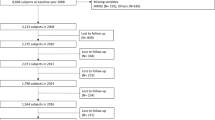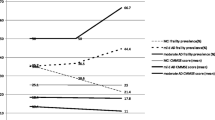Abstract
Objectives
Cognitive decline is related to frailty. Frailty can be operationalized in different ways, which have an unknown impact on the estimation of risk. Here, we compared 3 frailty measures in relation to cognitive changes and mortality in the Canadian Study of Health and Aging (CSHA).
Design
Prospective population-based study, with 5 year follow up.
Participants/Setting
2,305 subjects aged 70+ years.
Methods
For each participant, cognitive status was measured by the errors in the Modified Mini-Mental State Examination (3MS) score. Three frailty measures were used: a Frailty Index based on the Comprehensive Geriatric Assessment (FI-CGA) evaluated from 47 potential deficits, a Clinical Frailty Score and the Fried frailty phenotype. Multivariate Poisson regression and multivariate logistic regression were used to examine the association between baseline cognitive errors and frailty and death, respectively, while controlling for possible confounders (age, sex, education, and baseline cognitive status).
Results
Changes in cognitive status were strongly associated with baseline cognition and frailty, however defined. In multivariate models adjusted for age, sex and education, each frailty measure was associated with cognitive decline and with mortality. The frailest people (from the highest FI-CGA tertile) rarely showed cognitive improvement or stabilization (1.5%, 95% CI=0.002%–2.8%) compared with non-frail people (from the lowest tertile of the FI-CGA), of whom 27.8% (95% CI=24.5%–31.1%) did not deteriorate.
Conclusions
Frail elderly people have an increased risk of cognitive decline. All frailty measures allowed quantification of individual vulnerability and predict both cognitive changes and mortality.
Similar content being viewed by others
References
Fulop T, Larbi A, Witkowski JM, McElhaney J, Loeb M, Mitnitski A, Pawelec G. Aging, frailty and age-related diseases. Biogerontology. 2010;11:547–563.
Buchman AS, Boyle PA, Wilson RS, Tang Y, Bennett DA. Frailty is associated with incident Alzheimer’s disease and cognitive decline in the elderly. Psychosom Med. 2007;69:483–489.
Boyle PA, Buchman AS, Wilson RS, Leurgans SE, Bennett DA. Physical frailty is associated with incident mild cognitive impairment in community-based older persons. J Am Geriatr Soc. 2010;58:248–255.
Martin FC, Brighton P. Frailty: Different tools for different purposes? Age Ageing. 2008;37: 129–131.
Whitson HE, Purser JL, Cohen HJ. Frailty thy name is … Phrailty? J Gerontol A Biol Sci Med Sci. 2007:62:728–730.
Abellan van Kan G, Rolland Y, Houles M, Gillette-Guyonnet S, Soto M, Vellas B. The assessment of frailty in older adults. Clin Geriatr Med. 2010;26:275–286.
Fried LP, Tangen CM, Walston J, Newman AB, Hirsch C, Gottdiener J, Seeman T, Tracy R, Kop WJ, Burke G, McBurnie MA. Cardiovascular Health Study Collaborative Research Group: Frailty in older adults: evidence for a phenotype. J Gerontol A Biol Sci Med Sci. 2001;56A:M146–M156.
Mitnitski AB, Mogilner AJ, Rockwood K. Accumulation of deficits as a proxy measure of aging. ScientificWorldJournal. 2001;1:323–336.
Rockwood K, Mitnitski A. Frailty in relation to the accumulation of deficits. J Gerontol A Biol Sci Med Sci. 2007;62:722–727.
Mitnitski A, Song X, Skoog I, Broe GA, Cox JL, Grunfeld E, Rockwood K. Relative fitness and frailty of elderly men and women in developed countries and their relationship with mortality. J Am Geriatr Soc. 2005;53:2184–2189.
Kulminski AM, Ukraintseva SV, Kulminskaya IV, Arbeev KG, Land KC, Akushevich L, Yashin AI. Cumulative deficits better characterize susceptibility to death in elderly people than phenotypic frailty: lessons from the Cardiovascular Health Study. J Am Geriatr Soc. 2008;56:898–903.
Dupre ME, Gu D, Warner DF, Yi Z. Frailty and type of death among older adults in China: prospective cohort study. BMJ. 2009;338:b1175.
Jones DM, Song X, Rockwood K. Operationalizing a frailty index from a standardized comprehensive geriatric assessment. J Am Geriatr Soc. 2004;52:1929–1933.
Rockwood K, Rockwood MR, Mitnitski A. Physiological redundancy in older adults in relation to the change with age in the slope of a frailty index. J Am Geriatr Soc. 2010;58:318–323.
Rockwood K, Song X, MacKnight C, Bergman H, Hogan DB, McDowell I, Mitnitski A. A global clinical measure of fitness and frailty in elderly people. Can Med Assoc J. 2005;73: 489–489.
Canadian Study of Health and Aging Working Group. Canadian Study of Health and Aging: Study Methods and Prevalence of Dementia. Can Med Assoc J. 1994;150: 899–913.
McDowell, I, Kristjansson B, Hill GB, Hebert R: Community screening for dementia: the Mini Mental State Exam (MMSE) and Modified Mini-Mental State Exam (3MS) compared. J Clin Epidemiol. 1997;50:377–383.
Jones TG, Schinka JA, Vanderploeg RD, Small BJ, Graves AB, Mortimer JA: 3MS normative data for the elderly. Arch Clin Neuropsychol. 2002;17:171–177.
Mitnitski A, Bao L, Rockwood K. Going from bad to worse: A stochastic model of transitions in deficit accumulation, in relation to mortality. Mech Ageing Dev. 2006;127:490–493.
Mitnitski A, Rockwood K: Transitions in cognitive test scores over 5 and 10 years in elderly people: evidence for a model of age-related deficit accumulation. BMC Geriatr. 2008;8:3.
Fallah N, Mitnitski A, Middleton L, Rockwood K. Modeling the impact of sex on how exercise is associated with cognitive changes and death in older Canadians. Neuroepidemiology. 2009;33:47–54.
Andrew MK, Rockwood K. A five-point change in Modified Mini-Mental State Examination was clinically meaningful in community-dwelling elderly people. J Clin Epidemiol. 2008;61:827–831.
Rockwood K, Andrew M, Mitnitski A: A comparison of two approaches to measuring frailty in elderly people. J Gerontol A Biol Sci Med Sci. 2007;62A:738–743.
Peters R, Beckett N, Beardmore R, Peña-Miller R, Rockwood K, Mitnitski A, Mt-Isa S, Bulpitt C. Modelling cognitive decline in the Hypertension in the Very Elderly Trial [HYVET] and proposed risk tables for population use. PLoS One. 2010;5(7):e11775.
Mitnitski A, Fallah N, Wu Y, Rockwood K, Borenstein AR. Changes in cognition during the course of eight years in elderly Japanese Americans: a multistate transition model. Ann Epidemiol. 2010;20:480–486.
Middleton LE, Barnes DE, Lui LY, Yaffe K. Physical activity over the life course and its association with cognitive performance and impairment in old age. J Am Geriatr Soc. 2010;58:1322–1326.
Barrett-Connor E, Edelstein SL, Corey-Bloom J, Wiederholt WC. Weight loss precedes dementia in community-dwelling older adults. J Am Geriatr Soc. 1996;44:1147–1152.
Johnson DK, Wilkins CH, Morris JC. Accelerated weight loss may precede diagnosis in Alzheimer disease. Arch Neurol. 2006;63:1312–1317.
Camicioli RM, Wieler M, de Frias CM, Martin WR. Early, untreated Parkinson’s disease patients show reaction time variability. Neurosci Lett. 2008;441:77–80.
Amieva H, Le Goff M, Millet X, Orgogozo JM, Pérès K, Barberger-Gateau P, Jacqmin-Gadda H, Dartigues JF. Prodromal Alzheimer’s disease: successive emergence of the clinical symptoms. Ann Neurol. 2008;64:492–498.
Skoog I, Gustafson D. Update on hypertension and Alzheimer’s disease. Neurol Res. 2006;28:605–611.
Author information
Authors and Affiliations
Corresponding author
Rights and permissions
About this article
Cite this article
Mitnitski, A., Fallah, N., Rockwood, M.R.H. et al. Transitions in cognitive status in relation to frailty in older adults: A Comparison of three frailty measures. J Nutr Health Aging 15, 863–867 (2011). https://doi.org/10.1007/s12603-011-0066-9
Received:
Accepted:
Published:
Issue Date:
DOI: https://doi.org/10.1007/s12603-011-0066-9




